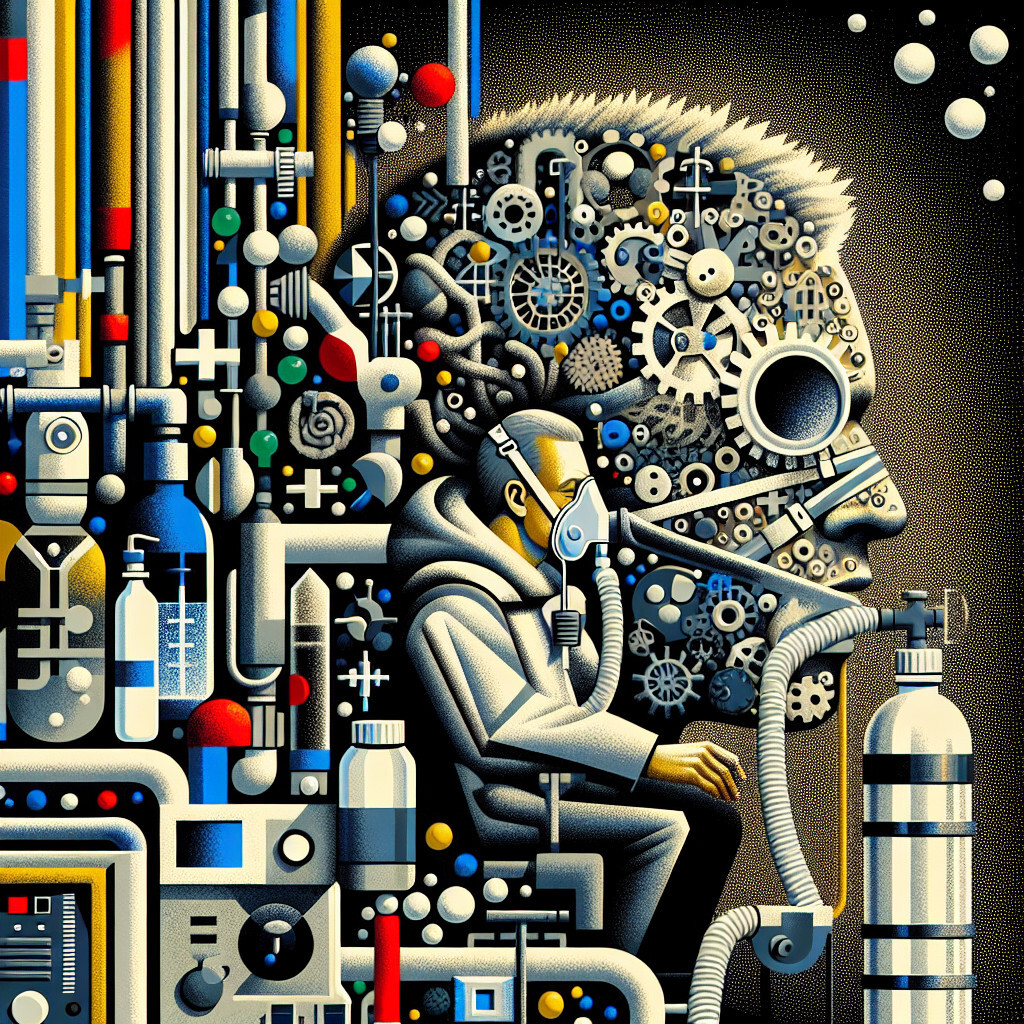-
Table of Contents
“Unfiltered Risks: The Hidden Side Effects of Using Tap Water in CPAP Machines.”
Introduction

The use of tap water in Continuous Positive Airway Pressure (CPAP) machines can potentially lead to several side effects. Tap water often contains minerals and other impurities that can build up in the machine and potentially cause damage. Additionally, these impurities can be dispersed into the air that the user breathes, potentially leading to respiratory issues. Furthermore, tap water may contain bacteria or other microorganisms that can multiply in the humid environment of the CPAP machine, increasing the risk of infection. Therefore, it is generally recommended to use distilled water in CPAP machines to avoid these potential side effects.
Understanding the Potential Risks of Using Tap Water in CPAP Machines
Continuous Positive Airway Pressure (CPAP) machines are a common treatment for sleep apnea, a condition characterized by interrupted breathing during sleep. These machines work by delivering a steady stream of air through a mask to keep the airways open, thus ensuring a restful night’s sleep. However, the type of water used in these machines can significantly impact their effectiveness and the user’s health. Specifically, using tap water in CPAP machines can pose potential risks that users should be aware of.
Tap water is generally safe for drinking and other household uses, but it may not be suitable for use in CPAP machines. This is primarily due to the presence of minerals and other impurities in tap water, which can accumulate in the machine over time. These impurities can cause damage to the machine, reducing its lifespan and effectiveness. Moreover, the buildup of minerals can also lead to the growth of bacteria and mold, which can pose serious health risks to the user.
When tap water evaporates during the CPAP machine’s operation, the minerals and impurities are left behind. Over time, these can build up in the machine’s humidifier chamber, leading to a condition known as scale or mineral deposits. This buildup can interfere with the machine’s operation, causing it to work harder and potentially shortening its lifespan. Furthermore, the presence of scale can make the machine more difficult to clean, which can further contribute to the growth of bacteria and mold.
The health risks associated with using tap water in CPAP machines are also significant. The buildup of bacteria and mold in the machine can lead to respiratory infections, including pneumonia. These organisms thrive in moist environments, and the humidifier chamber of a CPAP machine can provide an ideal breeding ground. When the machine is in use, these organisms can be inhaled into the lungs, leading to infection. This is particularly concerning for individuals with compromised immune systems, who may be more susceptible to these types of infections.
In addition to respiratory infections, the use of tap water in CPAP machines can also lead to other health issues. For example, the minerals in tap water can irritate the airways, leading to symptoms such as coughing, wheezing, and shortness of breath. These symptoms can be particularly problematic for individuals with pre-existing respiratory conditions, such as asthma or chronic obstructive pulmonary disease (COPD).
Given these potential risks, it is generally recommended to use distilled water in CPAP machines. Distilled water has had most, if not all, of its minerals and impurities removed through a process of boiling and condensation. This makes it safer for use in CPAP machines, as it reduces the risk of mineral buildup and bacterial growth. Moreover, distilled water is less likely to irritate the airways, making it a better choice for individuals with respiratory conditions.
In conclusion, while tap water may be convenient and readily available, its use in CPAP machines can pose potential risks to both the machine and the user’s health. By understanding these risks and opting for distilled water instead, users can ensure the longevity of their machines and safeguard their health.
The Unseen Side Effects of Using Tap Water in Your CPAP
Continuous Positive Airway Pressure (CPAP) therapy is a common treatment for obstructive sleep apnea, a condition that causes interrupted breathing during sleep. The CPAP machine works by delivering a constant flow of air through a mask to keep the airway open. However, the type of water used in these machines can have significant implications on the user’s health. Specifically, using tap water in a CPAP machine can lead to a range of unseen side effects.
Tap water is generally safe for drinking and bathing, but it’s not recommended for use in a CPAP machine. This is primarily because tap water contains minerals and other impurities that can build up in the machine over time. These mineral deposits can damage the machine, reducing its effectiveness and lifespan. Moreover, the impurities in tap water can also lead to the growth of bacteria and mold in the machine, which can then be inhaled by the user, potentially causing respiratory infections.
In addition to the risk of bacterial and mold growth, using tap water in a CPAP machine can also lead to a condition known as “CPAP lung.” This condition is characterized by inflammation and damage to the lungs caused by inhaling small particles of minerals and other impurities present in tap water. Symptoms of CPAP lung can include coughing, wheezing, shortness of breath, and chest pain. In severe cases, it can lead to more serious respiratory conditions such as pneumonia.
Furthermore, the use of tap water in a CPAP machine can also cause discomfort during therapy. The impurities in tap water can irritate the nasal passages and throat, leading to dryness, soreness, and inflammation. This can make it difficult for users to tolerate the therapy, reducing its effectiveness in treating sleep apnea.
Despite these potential side effects, many CPAP users continue to use tap water in their machines, often because they are unaware of the risks or because they find it more convenient than using distilled water. However, the potential health risks and damage to the machine far outweigh the convenience of using tap water.
The best alternative to tap water for use in a CPAP machine is distilled water. Distilled water is free from the minerals and impurities found in tap water, making it safe for use in a CPAP machine. Using distilled water can help to prevent the buildup of mineral deposits in the machine, reducing the risk of damage and prolonging its lifespan. It can also help to prevent the growth of bacteria and mold, reducing the risk of respiratory infections. Moreover, distilled water is less likely to cause irritation to the nasal passages and throat, making the therapy more comfortable for users.
In conclusion, while tap water may seem like a convenient option for use in a CPAP machine, it can lead to a range of unseen side effects. These can include damage to the machine, respiratory infections, CPAP lung, and discomfort during therapy. To avoid these risks, it is recommended to use distilled water in a CPAP machine. By making this simple change, CPAP users can help to protect their health and ensure the effectiveness of their therapy.
Why Tap Water in CPAP Machines Can Lead to Health Issues
Continuous Positive Airway Pressure (CPAP) machines are a common treatment for sleep apnea, a condition characterized by interrupted breathing during sleep. These machines work by delivering a steady stream of air through a mask to keep the airways open, thus ensuring a restful night’s sleep. However, the type of water used in these machines can significantly impact their effectiveness and the user’s health. Specifically, using tap water in CPAP machines can lead to several health issues.
Tap water is generally safe for drinking and bathing, but it’s not ideal for use in CPAP machines. This is primarily because tap water contains minerals and other impurities that can accumulate in the machine over time. These impurities can cause damage to the machine, reducing its effectiveness and lifespan. More importantly, they can also pose a risk to the user’s health.
When tap water is used in a CPAP machine, the water is heated and converted into a fine mist, which is then inhaled by the user. The minerals and impurities in the water become part of this mist and are inhaled into the lungs. Over time, this can lead to a condition known as pulmonary fibrosis, a lung disease that occurs when lung tissue becomes damaged and scarred. This condition can cause serious breathing difficulties and is often irreversible.
In addition to pulmonary fibrosis, using tap water in CPAP machines can also increase the risk of infection. Tap water can contain bacteria and other microorganisms that can thrive in the warm, moist environment of a CPAP machine. When inhaled, these microorganisms can cause respiratory infections, including pneumonia. These infections can be particularly dangerous for individuals with weakened immune systems or pre-existing respiratory conditions.
Furthermore, the use of tap water in CPAP machines can lead to the development of a condition known as CPAP-related sinusitis. This is an inflammation of the sinuses that can cause symptoms such as nasal congestion, facial pain, and a reduced sense of smell. The minerals and impurities in tap water can irritate the delicate tissues of the sinuses, leading to inflammation and infection.
Given these potential health risks, it is recommended that only distilled water be used in CPAP machines. Distilled water is free from minerals and other impurities, making it safe for use in these machines. It will not cause mineral buildup in the machine, reducing the risk of damage and prolonging the machine’s lifespan. More importantly, it will not pose a risk to the user’s health.
In conclusion, while tap water may seem like a convenient option for use in CPAP machines, it can lead to several health issues. The minerals and impurities in tap water can damage the machine and pose a risk to the user’s health, leading to conditions such as pulmonary fibrosis, respiratory infections, and CPAP-related sinusitis. Therefore, to ensure the effectiveness of the machine and the safety of the user, it is recommended that only distilled water be used in CPAP machines.
The Hidden Dangers of Using Tap Water in CPAP Therapy
Continuous Positive Airway Pressure (CPAP) therapy is a common treatment for sleep apnea, a condition characterized by interrupted breathing during sleep. The therapy involves the use of a CPAP machine that delivers a steady stream of air through a mask, keeping the airway open and ensuring uninterrupted breathing. However, the use of tap water in these machines can pose hidden dangers that users should be aware of.
Tap water is often used in the humidification chamber of the CPAP machine to prevent dryness in the nose and throat. While this seems harmless, tap water contains various impurities that can have detrimental effects on the user’s health and the machine’s functionality.
One of the primary concerns with using tap water in CPAP machines is the presence of minerals. Tap water is typically hard, meaning it contains high levels of minerals like calcium and magnesium. When used in a CPAP machine, these minerals can accumulate over time, leading to the formation of deposits or scale in the humidification chamber. This not only affects the machine’s performance but can also lead to the release of these minerals into the air that the user breathes in, potentially causing respiratory issues.
In addition to minerals, tap water can also contain bacteria and other microorganisms. While most of these are harmless, some can cause infections, especially in individuals with compromised immune systems. Using tap water in a CPAP machine can create a warm, moist environment that is ideal for bacterial growth. If inhaled, these bacteria can lead to respiratory infections, including pneumonia.
Furthermore, tap water often contains chlorine, a chemical used to disinfect the water. While chlorine is effective in killing bacteria, it can also cause irritation to the respiratory tract when inhaled. Long-term exposure to chlorine can lead to chronic issues such as bronchitis and other respiratory problems.
The use of tap water in CPAP machines can also lead to a condition known as “plasticizer leaching.” This occurs when the chemicals used to make the plastic components of the CPAP machine leach into the water. When this water is heated and inhaled, these chemicals can cause a variety of health issues, including hormonal disruptions and increased risk of certain cancers.
Given these potential risks, it is recommended that CPAP users use distilled water instead of tap water. Distilled water is free from the minerals, bacteria, and chemicals found in tap water, making it a safer choice for CPAP therapy. It also helps to maintain the machine’s performance by preventing mineral buildup.
In conclusion, while tap water may seem like a convenient option for use in CPAP machines, it carries hidden dangers that can impact both the user’s health and the machine’s functionality. By using distilled water, CPAP users can ensure a safer and more effective therapy. It is also important for users to regularly clean their CPAP machines to prevent the buildup of any potential harmful substances. By taking these precautions, individuals can continue to benefit from CPAP therapy without compromising their health.
Q&A
1. Question: What are the potential side effects of using tap water in a CPAP machine?
Answer: Using tap water in a CPAP machine can lead to mineral buildup in the machine, causing it to malfunction. It can also introduce bacteria or other pathogens into the air you breathe, potentially causing respiratory infections.
2. Question: Can using tap water in a CPAP machine cause skin irritation?
Answer: Yes, if the tap water contains high levels of chlorine or other chemicals, it could potentially cause skin irritation or dryness when the mist is breathed in.
3. Question: What are the long-term effects of using tap water in a CPAP machine?
Answer: Long-term use of tap water in a CPAP machine can lead to frequent machine malfunctions due to mineral buildup. It can also increase the risk of developing respiratory infections due to potential exposure to bacteria or other pathogens.
4. Question: Can using tap water in a CPAP machine affect the quality of sleep?
Answer: Yes, if the machine malfunctions due to mineral buildup or if the user develops a respiratory infection, it can disrupt sleep patterns and decrease the overall quality of sleep.
Conclusion
In conclusion, using tap water in CPAP machines can lead to potential health risks such as lung damage, respiratory infections, and inflammation due to the presence of minerals, bacteria, and other microorganisms in the water. It can also cause damage to the machine itself, reducing its lifespan and effectiveness. Therefore, it is recommended to use distilled water for CPAP machines.






